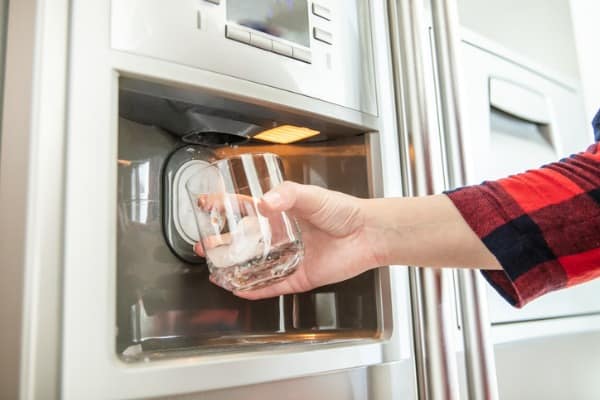The quality of drinking water has become a greater priority for many people. As a result, more and more homeowners are using water filtration devices in their homes. You may be wondering what the differences are between a Brita filter and the filter in your refrigerator and which is better for your situation.
When choosing between a Brita filter and a refrigerator filter certain considerations should be made such as:
- How many people live in the household
- What chemicals or minerals do you wish to eliminate
- Type of refrigerator you currently own
- Some plumbing may be necessary for a new refrigerator
For more information about the advantages and differences between the water filtration devices mentioned above continue reading.
Brita Filters – What You Need to Know
Brita makes different styles of water filtration devices such as the traditional pitcher style or, in more recent years, their faucet mount filter that provides you instantly filtered water straight from the tap.
Both styles work well for their intended use, but you may be wondering exactly what Brita filters remove from your drinking water. Brita claims to reduce the following items on the list below.
|
|
Read my article on what contaminants Brita filters remove from drinking water.
Risks and Advantages
Be forewarned that some versions of Brita’s filters may not be designed to remove everything on this list so it is important to read the label before purchasing to ensure you are buying a filter that is targeting everything on your list of priorities.
| Advantages of Brita Filter | Disadvantages of Brita Filter |
|
|
Now that you understand the pros and cons of using a Brita filter you can read on to learn about how refrigerator filters work.
Refrigerator Filters – Understanding What’s Involved
There are many reasons why people like to have a refrigerator with a filtered water dispenser, but you may be wondering what chemicals or toxins they target, and if there are any drawbacks to using this type of water filter.
Unlike the Brita filter, most refrigerators do not cover such a broad spectrum of chemicals and toxins. Generally, a refrigerator filter is designed to remove the chlorine that makes water taste and/or smell bad.
They are essentially designed for palatability purposes rather than health and safety reasons.
Additionally, most refrigerator filters do not remove lead or chromium-6 which can lead to serious health conditions when ingested in large doses.
| Refrigerator Filter Advantages | Refrigerator Filter Disadvantages |
|
|
Read my other articles on refrigerator filters:
Does Your Refrigerator Water Filter Treat PFAS
How Well Does Your Refrigerator Water Filter Work?
Do Refrigerator Water Filters Remove Chlorine? Everything You Need to Know
Do Refrigerator Filters Remove Lead? Comprehensive Evaluation
Do Refrigerator Filters Remove Fluoride? Surprising Answer
Do Refrigerator Water Filters Expire? You May Be Surprised
Keep reading for tips on how to decide which option is best for your home and lifestyle.
Making the Right Choice – Brita or Refrigerator Filter
Now that you have the facts about the two types of filters discussed in this article you may be wondering which option will work best in your home with your lifestyle. The following list may help with your decision-making process.
- Do you rent or own your home? If renting, do you have permission to make necessary adjustments to accommodate a refrigerator that dispenses water?
- Do you have existing plumbing in the refrigerator area?
- How many people are in your household?
- Do you/others in the home drink a lot of water?
- Are you concerned about chemicals/toxins or just want drinking water that smells and tastes good?
- Is your area prone to certain chemicals/toxins that other areas may not have to worry about as much?
- Will your budget allow the purchase of a new refrigerator with a water dispenser and any labor costs needed for installation/plumbing?
These are just a few of the questions you should ask yourself when deciding which option will make the most sense for your lifestyle, home, and budget. Knowing the answers before you go shopping will ensure you make the right choice.
Better for the Environment – Better for Your Health
Regardless of which option you choose you are making the right choice. Studies have shown and proven that drinking from plastic bottles is detrimental to our health and has been linked to being carcinogenic.
Making the switch from bottled water to filtered water from your home is not only a great way to help reduce your footprint on the environment but can greatly reduce your risk of certain types of cancers.
Fresh Tasting Drinking Water Either Way You Choose
So, all in all, both systems are good if you wish to have drinking water that tastes good and skip the harmful chemicals in plastic bottles. If you live in an area where certain toxic chemicals such as arsenic, fluoride, or other harmful contaminants are in your water, you may need to consult with a professional about having an in-home system installed with special filters.

